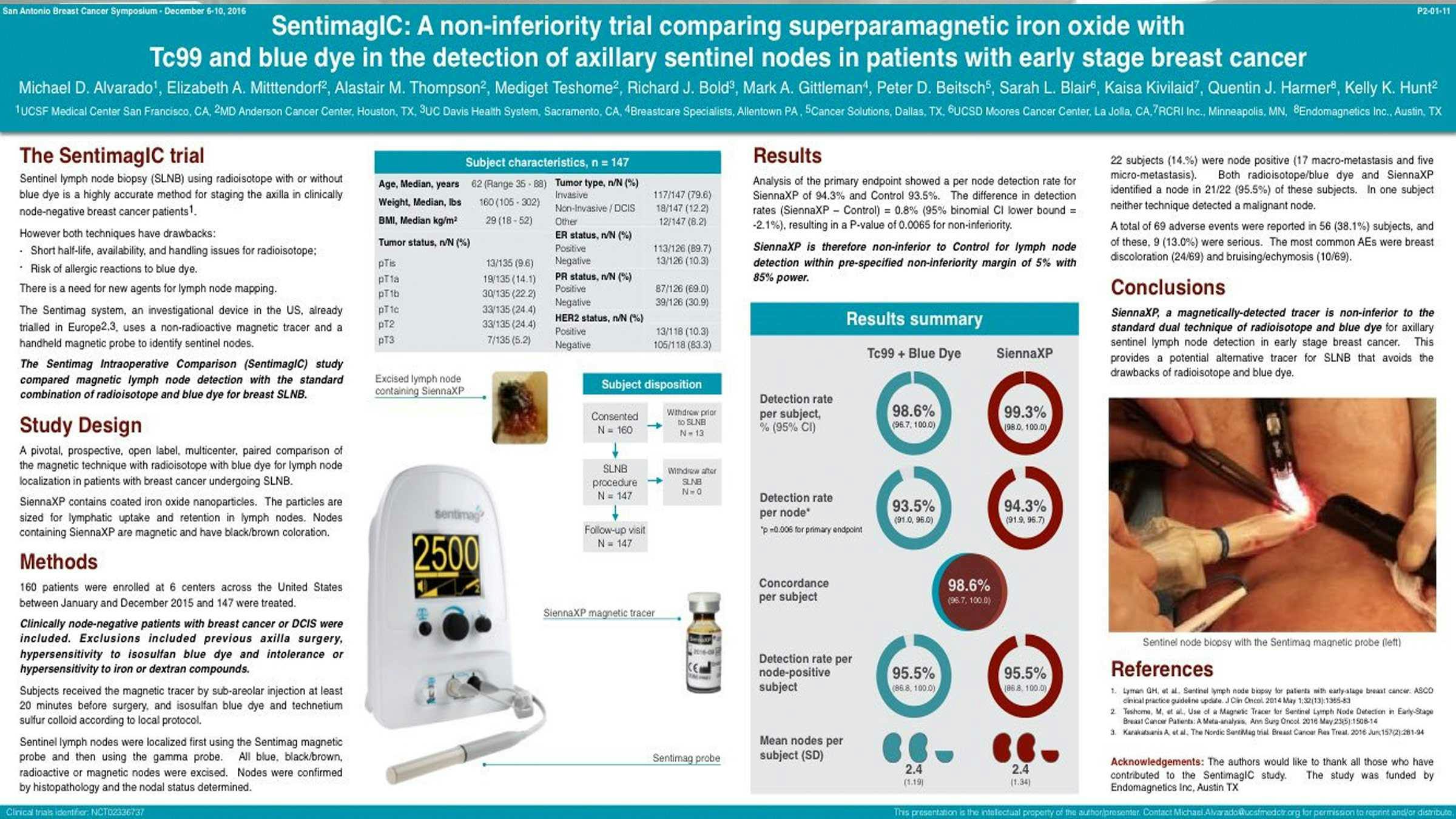US Multi-Centre Trial Published at SABCS 2016

Endomag announced today that its Sentimag® and Sienna+® system for sentinel lymph node detection in early stage breast cancer has been shown to be non-inferior to the current standard of care in US patients.
The announcement follows completion of a multi-centre trial, which commenced in January 2015. The results were presented today, at the 39th annual San Antonio Breast Cancer Symposium (SABCS), by Dr Michael Alvarado from University of California San Francisco (UCSF), who led the study.
The trial, which enrolled 160 subjects in 10 months at six clinical sites, compared Endomag’s Sentimag® and Sienna+® lymphatic tracer magnetic system with the gold standard radioisotope-based technique for mapping lymph nodes as part of sentinel lymph node biopsy procedure for cancer staging. The results concluded that the Endomag system is non-inferior to the standard of care for axillary sentinel lymph node detection in early stage breast cancer, demonstrating the potential for Sentimag® and Sienna+® lymphatic tracer to be used as a non-radioactive alternative for sentinel node detection.
Sentimag® and Sienna+® lymphatic tracer were developed so that patients and surgeons can avoid the use of radioactive tracers. Injected 20 minutes before surgery, Sienna+® flows to the lymph nodes draining from the primary tumour site that potentially harbour metastatic cancer cells. The Sentimag® handheld probe works by generating an alternating magnetic field which transiently magnetises the iron oxide particles in Sienna+®. The tiny magnetic signature generated by the Sienna+® lymphatic tracer particles is then detected by the Sentimag® probe, allowing surgeons to locate sentinel lymph nodes with great accuracy.
Sentimag® and Sienna+® remove the radiation from the operation, as well as the painful injection that often occurs in the nuclear medicine department prior to anaesthesia. The magnetic technique can also be used in any hospital, not just those with access to a nuclear medicine department. Sienna+® is the first magnetically detected lymphatic mapping agent to be trialled in the US under an Investigational Device Exemption (IDE). Outside of the US it has treated over 18,000 patients since it received CE approval in December 2011.
Dr Michael Alvarado, Breast Cancer Surgeon from UCSF, said: “Having a technique that mirrors the current sentinel node procedure, while making it more convenient for both the patient and the hospital, is very attractive. We’ve been watching this technology become established in Europe over the past few years, and have been eagerly awaiting its availability in the US. I was impressed with how easy the technique was to learn, how intuitive the system was to use, and ultimately, as Principal Investigator for the trial, that our clinical outcomes matched the results that have been seen in the numerous European trials of Sienna.”
Dr Quentin Harmer, Chief Technology Officer at Endomag, commented: “Use of Sentimag and Sienna has the potential to make the procedure of sentinel lymph node detection more convenient for patients and much simpler for hospitals and surgeons. The trial included some of the world’s leading cancer academic institutions, and the data being presented today is further validation of the clinical performance of Sentimag and Sienna in the management of early stage breast cancer, and will form the basis for our Pre-Market Approval (PMA) submission to the FDA.”
The six clinical sites involved in the trial were the University of California San Francisco Cancer Center, the MD Anderson Cancer Center, the UC Davis Health Sytem, Breastcare Specialists, Cancer Solutions and the University of California San Diego Moores Center.
Endomag and UCSF will be presenting a poster on the study at the 39th annual San Antonio Breast Cancer Symposium (SABCS), December 6th-10th 2016. The poster can be viewed here.